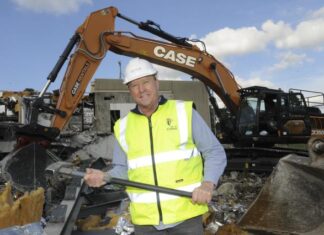MY view is that if the case of Cardinia Shire versus Tynong couple Tas and Jess Williams goes to court the Williams would have a better than even chance of retaining ownership of land they believe belongs to them.
So I welcome Cardinia mayor Kate Lempriere’s statement that she will ask for rethinking on this issue (see page 5).
Even during the past three years I have seen officials ‘get off’ skulduggery that any reasonable person would think should have led to a severe penalty.
Two cases were a blatant abuse of any legal system.
Based on this and the documents they hold, the Williams have a prima facie case that gives them a fair hold on land the council claims to be Goodwin Street and therefore its land.
Certainly it was Goodwin Street in the early planning process, but the titles office recorded that section of Goodwin Street as part of Number 38 Railway Avenue, clearly owned by the family.
Somehow, somewhere, a bureaucratic administrator drew lines on the Williams’ title giving them at least a perceived ownership of the street section.
This is significant.
But it is not so easy to find out who made the consolidation, when and why?
The Williams bought the land and gained finance on the basis of the title and have since paid for the property.
Cr Kate Lempriere said the council, by taking the land, was acting in the interests of the community because it needed to provide a site for a new post office.
This, of course, is a council spin and bunkum – the post office could go anywhere.
The ‘community interest’ needs to be strong to take someone’s titled property and clearly the property is listed on a governmentissued title.
Land title is a sacred, treasured and guaranteed privilege that is the basis for our structured and stable way of life.
Bearing this in mind and the obvious fact that the land is vested in the Williams’ name on the title, the matter should be taken further than a council decision based on its own solicitor’s advice.
This should be tested at law in the High Court, but who pays to represent the ordinary guy in such an action when officialdom has unlimited resources to engage the best barristers?
This ‘who pays’ syndrome is the shortcoming of our legal system.
The family has said it cannot afford to take the matter to court, and few families could afford such an action to save a small block of land.
But from what I have seen in the courts over many years, there is at least a 50/50 chance of a court action on this matter coming in favour of the common citizen.
Perhaps it is unfair of me to say this, but legal companies singularly or collectively who have done well from the legal system have here a case that justifies a pro bono action.
Pro bono means for the ‘public good’ – very close to the council’s ‘in the interests of the community’.
The Victorian Law Federation says pro bono aims to ensure justice for all persons regardless of their ability to pay.
It is made possible because lawyers donate a percentage of their time to people who do not have access for one reason or another to legal assistance.
However, the mayor has gone out on a limb and wants to reexamine the issue.
Full marks for this action, but she rightfully still strongly defended the council’s actions so far.
Cr Lempriere shows character by wanting to look for another way, possibly one that may cost very little and win lots of brownie points for the council.
But she said similar situations to the Williams’ land existed in other places.
That being the case, it is time for councils all over to look at these title problems and have a definitive decision made on each to avoid the type of heartache being caused over this issue.
‘Little man’ at disadvantage
Digital Edition
Subscribe
Get an all ACCESS PASS to the News and your Digital Edition with an online subscription
Former Casey Mayor diagnosed with MND
Ex two-time Casey Mayor and VFL footballer Geoff Ablett has been diagnosed with Motor Neurone Disease (MND), prompting his family to launch a fundraising...







